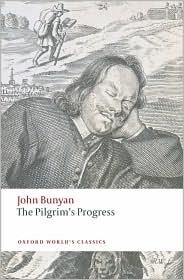STUDY SESSION 11
Introduction (pp. 145-154)
Christian and Hopeful come to Beulah land and then enter the gates of the celestial city. Their death before entering heaven and their struggles with their own personal failures also come to light.
Readers
Narrator (145) – does most of the reading
Gardener (146-7) — a few lines
Christian & Hopeful have very little apart from the summary statements made by the narrator.
Shining ones, Heavenly Host, etc. — several lines here and there
Vocabulary
“Beulah” (145 †) — “married” in Hebrew [from Isaiah 62:4, “but thou shalt be called Hephzi-bah, and thy land Beulah: for the LORD delighteth in thee, and thy land shall be married.”]
Questions (pp. 145-154)
Page #
145 What do you think the “Country of Beulah” represents?
146 Explain the “pangs” or sickness that overcame Christian and Hopeful.
147 What does the river represent? How is the depth (148) dependent upon the Pilgrim’s faith? (“You shall find it deeper or shallower, as you believe in the King of the place.”)
148 What frightened Christian as he crossed the river?
153-4 Ignorance comes up again. What was his problem? How did he get across the river of death? Explain what “Vain-hope a Ferry-man” represented.
154 Why is this sentence so important, “Then I saw that there was a way to Hell, even from the Gates of Heaven, as well as from the City of Destruction.” (154)
Observations & Notes
BEULAH (145)
Bunyan seems to view Beulah as those last sweet peaceful moments some believers face before their death. What he says of this place is remarkable: “…this was beyond the Valley of the shadow of death, and also out of the reach of Giant Despair; neither could they from this place so much as see Doubting Castle.” (146) It is a scent of heaven before entering heaven (“…within the sight of the City they were going to”). It is “almost a suburb of heaven” (Horner, 273) or the “foretastes of heaven as we draw near to the River of Death” (Cheever, 454) — Bunyan calls it “the Borders of Heaven” (146). Not all believers experience this but some do. (cf. Thomas Scott, 202-3)
Horner takes this to mean the kind of pastoral ministry ministers utilize to comfort senior saints as they prepare for death (Horner, 74, 274). His interpretation seems to make sense of the experience but it could simply be the comforting grace many believers receive before they die.
FELL SICK (146)
This is considered spiritual love sickness. At times mystical in character, such language characterized the Puritan way of viewing the Song of Solomon. The love of the bride represented the love of the Saint/church for Christ. Thomas Scott explained “sick of love” in these words: “In the immediate view of heavenly felicity, Paul ‘desired’ to depart hence and be with Christ, as far better than life; and David ‘fainted for God’s salvation.’ In the lively exercise of holy affections, the believer grows weary of this sinful world; and longs to have his faith changed for sight, his hope swallowed up in enjoyment, and his love perfected, and secured from all interruption and abatement.” (203)
YOU MUST OBTAIN IT BY YOUR OWN FAITH (147)
Each man must die on his own; he alone can cross the river and go to the gates of the celestial city. There is no proxy dying. A king and a pauper must both cross the river on their own and each shall obtain salvation as he looks in faith to Christ.
VAIN-HOPE (153-154)
“Vain-hope ever dwells in the bosom of fools, and is ever ready to assist Ignorance. He wanted him at the last, and he found him. He had been his companion through life, and will not forsake him in the hour of death. You see Ignorance had no bands in his death, no fears, doubts, and sorrows, no terror from the enemy, but all was serene and happy. Vain-hope was his ferryman, and he, as the good folk say, died like a lamb: ah ! but did such lambs see what was to follow, when Vain-hope had wafted them over the river — they would roar like lions!” (Mason, 190)
FUMBLED IN HIS BOSOM (154)
He was supposed to present his certificate. He did not have one. He willfully resisted all the gospel teaching he received and believed it will fare well with him. “His final fumbling for a certificate that he does not have represents Ignorance searching his heart for a faith that he never possessed. Ignorance stands for the cool, skeptical modern person who wants to ground his or her faith in conscience and conduct, not in the grace of God to an unworthy sinner.” (Calhoun, 78)
A WAY TO HELL, EVEN FROM THE GATES OF HEAVEN (154)
Some unacquainted with genuine saving grace die composed and assured of their salvation. But their faith is delusional. “But what do they prove? What evidence is there, that such men are saved? Is it not far more likely that they continued to the end under the power of ignorance and self-conceit; that Satan took care not to disturb them; and that God gave them over to a strong delusion, and left them to perish with a lie in their right hand? Men, who have neglected religion all their lives, or have habitually for a length of years disgraced an evangelical profession, being when near death visited by pious persons, sometimes obtain a sudden and extraordinary measure of peace and joy, and die in this frame. This should in general be considered as a bad sign: for deep humiliation, yea distress, united with some trembling hope in God’s mercy through the gospel, is far more suited to their case, and more likely to be the effect of spiritual illumination.” (Thomas Scott, 211)
THE END
